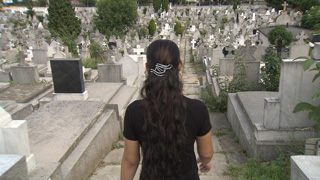Revision
 GERMANY / 2012 / German, Romanian / Color / Blu-ray / 106 min
GERMANY / 2012 / German, Romanian / Color / Blu-ray / 106 min
Director: Philip Scheffner
Script: Merle Kröger, Philip Scheffner
Photography: Bernd Meiners
Sound: Pascal Capitolin, Volker Zeigermann
Sound Design: Volker Zeigermann, Simon Bastian
Sound Mix: Pierre Brand
Line Producer: Marcie K. Jost
Co-producers: Marcie K. Jost, Meike Martens, Peter Zorn
Producer: Merle Kröger
Production Company, World Sales: pong Kröger und Scheffner GbR www.pong-berlin.de
In 1992, the corpses of two illegal immigrants from Romania were discovered in the cornfields straddling the German and Polish border. In 2012, director Philip Scheffner carried out a cinematic investigation into the incident, which had been disposed of by the German authorities as an “accidental gunshot fired by a hunter.” Like a puzzle, his film combines testimonies from those related to the event and the results of the director’s own independent investigation with landscape and documentation. This thrilling experiment reveals an unexpected side of the incident, surfacing the histories of violence and discrimination that have taken root in this land.
[Director’s Statement] The film starts with the end of a story. Statistics published by the NGO Fortress Europe state that at least 14,687 people were reported in the media to have died along the European border between 1988 and August 2009. As a piece of news, their death makes them part of European history and simultaneously deprives them of a voice in its historiography. They become silent witnesses to a European security discourse that mainly revolves around itself, tacitly accepting the deaths.
Revision is an attempt to trace the open ends of such a piece of news and explore the cinematic possibilities of capturing its protagonists as agents of a story, a story with multiple beginnings.
The film reconstructs the biographical and political perspectives of the narratives, which simultaneously bring up and question the conditions and conventions of my own filmic narration as part of a larger political context. On a formal level, an analysis of the term “testimony / witness” is important.
Judicially, a witness is characterized as a person “reporting perceived facts.” Mere perception though is insufficient—for a person to become a witness, a counterpart is required, a listener who functions as witness to the actual testimony. Capturing this complex relationship between the speaker and the listener is a vital part of the film.
When listening to his own narration, the protagonist becomes witness to his own testimony and thus connects with the spectator who experiences the Revision of the spoken.
This “filmed listening” gives the person in front of the camera a means of control and alters power balances in the room. The documentary moment, the seeming authenticity that manifests when someone forgets that the camera is on, is shattered in the very act of filming.
 Philip Scheffner
Philip Scheffner
Born on May 28th, 1966 in Homburg / Saar. Philip Scheffner has lived in Berlin since 1986, working on documentary films, video, and sound art. Together with Merle Kröger, he runs the production platform “pong.” His films include a/c (1992–2000), India in Mind (2003), The Halfmoon Files (2007), Day of the Sparrow (2010), and several short and feature films with the video collective “dogfilm,” which consists of Tina Ellerkamp, Jörg Heitmann, Ed van Megen, Merle Kröger, and Philip Scheffner.
